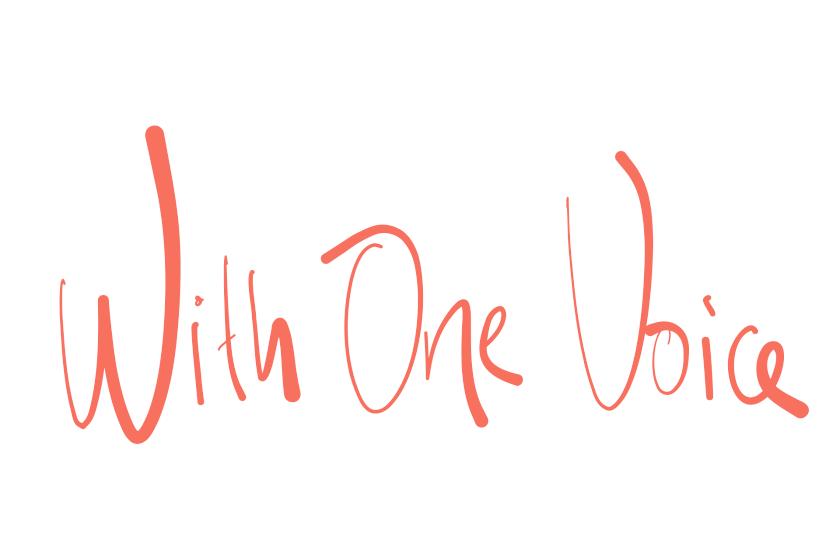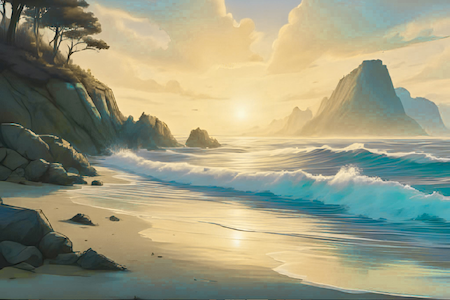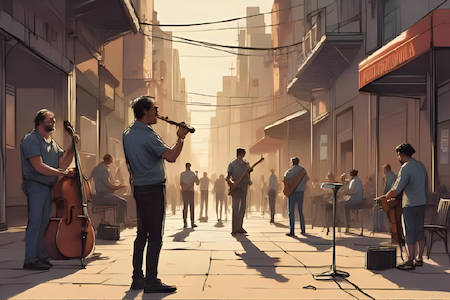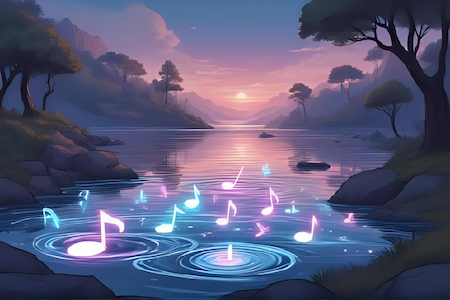
With One Voice - August 2025
Available in English, French, Spanish, and Portuguese
This month, With One Voice details how music is reviving Māori culture across New Zealand, the importance of deep connections with your music's supporters, and an exploration of the many values of music.

The Māori Language is the Hero: How Music is Reinvigorating Culture in New Zealand
"Indigenous peoples have the right to maintain, control, protect and develop their cultural heritage, traditional knowledge and traditional cultural expressions, as well as the manifestations of their sciences, technologies and cultures." - Article 31 United Nations Declaration on the Rights of Indigenous Peoples
"A great visionary of waiata said to me once that “the Māori language is the hero”. We as benefactors of the language and culture must keep it humble and maintain our responsibility and duty to what our ancestors left us." - Dame Hinewehi Mohi
A concerted effort to create a bilingual New Zealand music industry that elevates and preserves the endangered Māori language is growing. Not since "Poi E" in 1984 has a reo Māori song reached #1 on the New Zealand charts. Its immense popularity fostered a sense of pride and comfort around the language, paving the way for its designation as an official language with the Māori Language Act 1987.
A central figure to Māori music is Dame Hinewehi Mohi. In 1999, she became the first person to sing the New Zealand national anthem in Māori at the Rugby World Cup at Twickenham, sparking a difficult nationwide conversation about cultural identity and language. After her performance, the Māori version of the national anthem was adopted bilingually and is well known in both languages to this day.
To celebrate this significant event, Dame Hinewehi in partnership with Universal Music released “Waiata Anthems” in 2019, a compilation of some of New Zealand’s most well-known pop songs, translated and sung by the artists themselves in Māori. This major undertaking required buy-in and collaboration from major labels as well as the artists, some of whom, as Māori, had never sung in their native language before. Dame Hinewehi had each song translated by language experts and provided deep pronunciation coaching to the participants. The album was the first fully reo album to reach #1, providing the public with an unprecedented collection of modern Māori language pop songs to enjoy.
Her unique ability to unite the music industry earned her a dedicated role at APRA AMCOS as Manukura, Puoro Māori / Director of Māori Membership. This new position, along with the organisation's support, empowered her and her team to lead numerous projects. A notable example is the translation of Lorde's album, "Solar Power," to “Te Ao Mārama,” which Lorde herself sang entirely in te reo Māori, working with language experts Sir Tīmoti Kāretu, Hana Mereraiha, and Hēmi Kelly to adapt the lyrics. Another project, “The Aotearoa Songbook,” serves as a digital resource preserving heritage and legacy works by recording correct, definitive versions with accurate attributions. This initiative produced the hit “Tōku Reo Tōku Ohooho”, still featuring highly in the Music Charts 9 months after its release.
In 2021, Recorded Music New Zealand established The Official Top 10 Te Reo Māori Singles chart. Recently, several waiata reo Māori have achieved consecutive #1 positions on the "Hot 20 Aotearoa Singles Chart," signaling sustained, increasing mainstream acceptance. Strategic funding initiatives reinforce this rise, such as NZ On Air's "Waiata Takitahi" co-fund with Te Māngai Pāho, supporting the creation and promotion of bilingual singles.
Radio airplay of waiata reo Māori on major commercial networks surged five-fold from 2019 to 2021. Streams of waiata reo tracks reached 17.1 million units in Q4 2024—an 18.2% increase on Q4 2023—and comprised 7.9% of total NZ streams.
Not content that France held the world record for the largest haka, Dame Hinewehi organised an event to bring the title back to New Zealand. In September 2024, 6,500 people performed “Ka Mate” at Eden Park (surpassing the French record of 4,028.) This was authenticated by the Guinness World Records and recognised as one of its "Happiest Stories of 2024” by the BBC.
These developments not only celebrate the prominence of Māori music within the industry landscape but encourage and ensure its potential for generations to come.
Bic Runga - Songwriter and Producer, CIAM ExCo Member

You Don’t Need to Go Viral to Go Direct
As a songwriter, I know how exhausting it can be to chase streams, clicks, and ever-changing algorithms. I’ve watched artists I admire pour their hearts into music, only to feel invisible unless they’re playing by someone else’s rules.
I’ve felt it too. That quiet frustration. Like something essential is missing.
What’s missing isn’t just money—it’s connection. That deeper bond between artist and listener. The kind that validates what we feel, reflects what we can’t say out loud, and makes the whole struggle feel worth it. When people discover a piece of music that truly resonates, they’re not just finding a song. They’re finding themselves in it.
That’s why the idea of going direct matters. You don’t need millions of streams—you need 1,000 real supporters. People who come back, who pay attention, who care. That’s what builds a career. And if you’re reading this, you probably already know that.
Not long ago I heard activist Maia Kahlke Lorentzen say, “Our home on the internet always leaves us.” That line stuck with me.
Because yeah—what used to feel like building something personal now feels like tossing your work into a noisy, endless feed and hoping someone notices.
We’re drowning in metrics. And losing meaning.
But there’s a shift happening—and fast. MIDiA Research calls it a “recalibration” of the creator economy. We’re moving from scale to sustainability. From noise to depth. From borrowed platforms to owned relationships. Ari Herstand is calling it the direct-to-fan era. That’s where we are. And there’s no going back.
It’s a mindset shift that mirrors what every working artist already knows: it’s your core community—the fans who come back, who care, who stay—that keeps you going. Like any creative business, it’s the repeat listeners that make things sustainable. Not the fleeting hits.
That’s why we started building Sleeve—for the millions of streaming-broken, algorithm-weary musicians who deserve better than rented audiences and disappearing reach.
You can turn listeners into loyal supporters—and give your biggest fans a place to truly connect. Create paid memberships, share exclusive content, and earn monthly income that actually adds up—especially compared to what streaming pays. Post your work—early tracks, behind-the-scenes video, demos—and sell music directly, on your terms. Add digital liner notes to give fans the story behind the songs. Run your fan club. Bring all your links and offers into one place. And most importantly, start with the fans who already care.
So no, you don’t need to go viral.
You need to go direct.
Because when one fan pays you $5/month, that’s the equivalent of over a thousand streams. Get 10 people to do that, and you’ve already out-earned most artists on Spotify. But more importantly? You’ve built something real. Something that doesn’t disappear with the next algorithm change. Something that lasts.
If this resonates, come give Sleeve a try. Tell us what’s missing. Help shape the kind of space we all wish existed.
Stay tuned,
Anna Lidell – Songwriter and Musician, former CIAM ExCo Member and Co-founder of Sleeve

Reflections on the value of music
Music is a language and means of global expression. It has intangible value as it is cultural and part of a country's historical wealth. It has social value as it is a vehicle for expressing identity and connecting people. It also has emotional value as it evokes moments, memories, and influences people's moods.
On the other hand, if we were to look at it from an economic perspective, from the search for compensatory benefits, what is the value of music? From what perspective can we consider its value? From the perspective of the average person? From the perspective of the collecting society that collects and distributes royalties? Or from the perspective of the value that the author and composer might consider?
If it's for a person or average listener, it's very likely that music only has a spiritual value for conveying emotions and feelings. Countless songs have been companions to millions of people, who made these songs their own at different times in their lives and throughout history.
For the author and composer, what value does their music, their work, have? Are they satisfied with the royalties they generate, or do they feel they deserve greater financial recognition? Do they assume that all the work they’ve done to bring their vision to light compensates for the accrued royalties? Is it likely that some certain dimension is lost, precisely because they value it from their own creator's perspective? And, of course, we mustn't forget the participation of publishers, which also receive a percentage of these royalties.
Collecting societies are known to protect intellectual property rights as well as collecting, distributing, and allowing creators to collectively monetize their songs. They can legally defend those rights, which is difficult for an author to manage them individually. We are left to wonder if the ODS fees are ultimately fair enough to give music an exact value.
I believe that giving music a material value is an issue that leaves us with more questions than answers and more doubts than certainties, even as music consumption continues to grow rapidly around the world. Without a doubt, music has an intrinsic value that goes beyond its economic value. Its impact on culture, emotions, and universal development makes it an essential part of the human experience.
Facundo Saravia - Songwriter and CIAM ExCo Member
